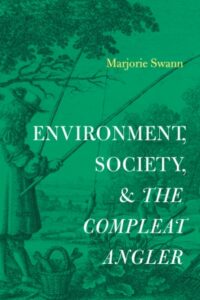 “The Compleat Angler ranks second only to the King James Bible as the most frequently reprinted book in the English language.” So wrote Prof. Marjorie Swann in her introduction to the 2014 edition (now available as the 2016 Oxford World’s Classics paperback edition of the book), for which she was the editor, of Oxford University Press’ publication of the fifth edition of Izaak Walton and Charles Cotton’s classic book. That such a remarkable achievement should have been accomplished by a book that is put forward as an instruction manual on fishing is in itself quite surprising indeed. But as those who know the book know, it is not simply a book about fishing.
“The Compleat Angler ranks second only to the King James Bible as the most frequently reprinted book in the English language.” So wrote Prof. Marjorie Swann in her introduction to the 2014 edition (now available as the 2016 Oxford World’s Classics paperback edition of the book), for which she was the editor, of Oxford University Press’ publication of the fifth edition of Izaak Walton and Charles Cotton’s classic book. That such a remarkable achievement should have been accomplished by a book that is put forward as an instruction manual on fishing is in itself quite surprising indeed. But as those who know the book know, it is not simply a book about fishing.
First published in the aftermath of the English Civil War and its catastrophic effects upon the society and the land, The Compleat Angler has for nearly four hundred years captured and held the attention of a far wider readership than just fishermen. Why and how this unexpected situation has come to be is the subject of the aforementioned Prof. Swann’s new book Environment, Society, & The Compleat Angler.
Examining the The Compleat Angler through many different critical lenses, particularly that of ecocriticism, Prof. Swann seeks to delve beneath the common understandings of the book as either an instruction manual for aspiring fishermen, or a veiled statement of confirmation by the authors with Royalist and Anglican Church causes, and explore it as a social and early ecological treatise.
Does she succeed? I haven’t yet determined that as I’m giving the fifth edition of The Compleat Angler another read before getting stuck in to Prof. Swann’s new book. I can say this however; if there is anything to be found in Walton and Cotton that may be argued to support the arguments, her expertise in the work itself, it’s overall subject area, and the period in which it was written bode well for the search indeed.
If you enjoyed reading this, please consider signing up for The Well-read Naturalist's newsletter. You'll receive a helpful list of recently published reviews, short essays, and notes about books in your e-mail inbox once each fortnight.
